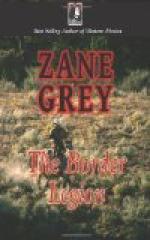Joan dismounted. There was water in the wash, and she helped Roberts bathe the sprained and swelling joint. In the interest and sympathy of the moment she forgot her own trouble.
“Reckon we’ll have to make camp right here,” said Roberts, looking around. “Lucky I’ve a pack on that saddle. I can make you comfortable. But we’d better be careful about a fire an’ not have one after dark.”
“There’s no help for it,” replied Joan. “Tomorrow we’ll go on after Jim. He can’t be far ahead now.” She was glad that it was impossible to return home until the next day.
Roberts took the pack off his horse, and then the saddle. And he was bending over in the act of loosening the cinches of Joan’s saddle when suddenly he straightened up with a jerk.
“What’s that?”
Joan heard soft, dull thumps on the turf and then the sharp crack of an unshod hoof upon stone. Wheeling, she saw three horsemen. They were just across the wash and coming toward her. One rider pointed in her direction. Silhouetted against the red of the sunset they made dark and sinister figures. Joan glanced apprehensively at Roberts. He was staring with a look of recognition in his eyes. Under his breath he muttered a curse. And although Joan was not certain, she believed that his face had shaded gray.
The three horsemen halted on the rim of the wash. One of them was leading a mule that carried a pack and a deer carcass. Joan had seen many riders apparently just like these, but none had ever so subtly and powerfully affected her.
“Howdy,” greeted one of the men.
And then Joan was positive that the face of Roberts had turned ashen gray.
2
“It ain’t you—Kells?”
Roberts’s query was a confirmation of his own recognition. And the other’s laugh was an answer, if one were needed.
The three horsemen crossed the wash and again halted, leisurely, as if time was no object. They were all young, under thirty. The two who had not spoken were rough-garbed, coarse-featured, and resembled in general a dozen men Joan saw every day. Kells was of a different stamp. Until he looked at her he reminded her of someone she had known back in Missouri; after he looked at her she was aware, in a curious, sickening way, that no such person as he had ever before seen her. He was pale, gray-eyed, intelligent, amiable. He appeared to be a man who had been a gentleman. But there was something strange, intangible, immense about him. Was that the effect of his presence or of his name? Kells! It was only a word to Joan. But it carried a nameless and terrible suggestion. During the last year many dark tales had gone from camp to camp in Idaho—some too strange, too horrible for credence—and with every rumor the fame of Kells had grown, and also a fearful certainty of the rapid growth of a legion of evil men out on the border. But no one in the village or from any of the camps ever admitted having seen this Kells. Had fear kept them silent? Joan was amazed that Roberts evidently knew this man.




